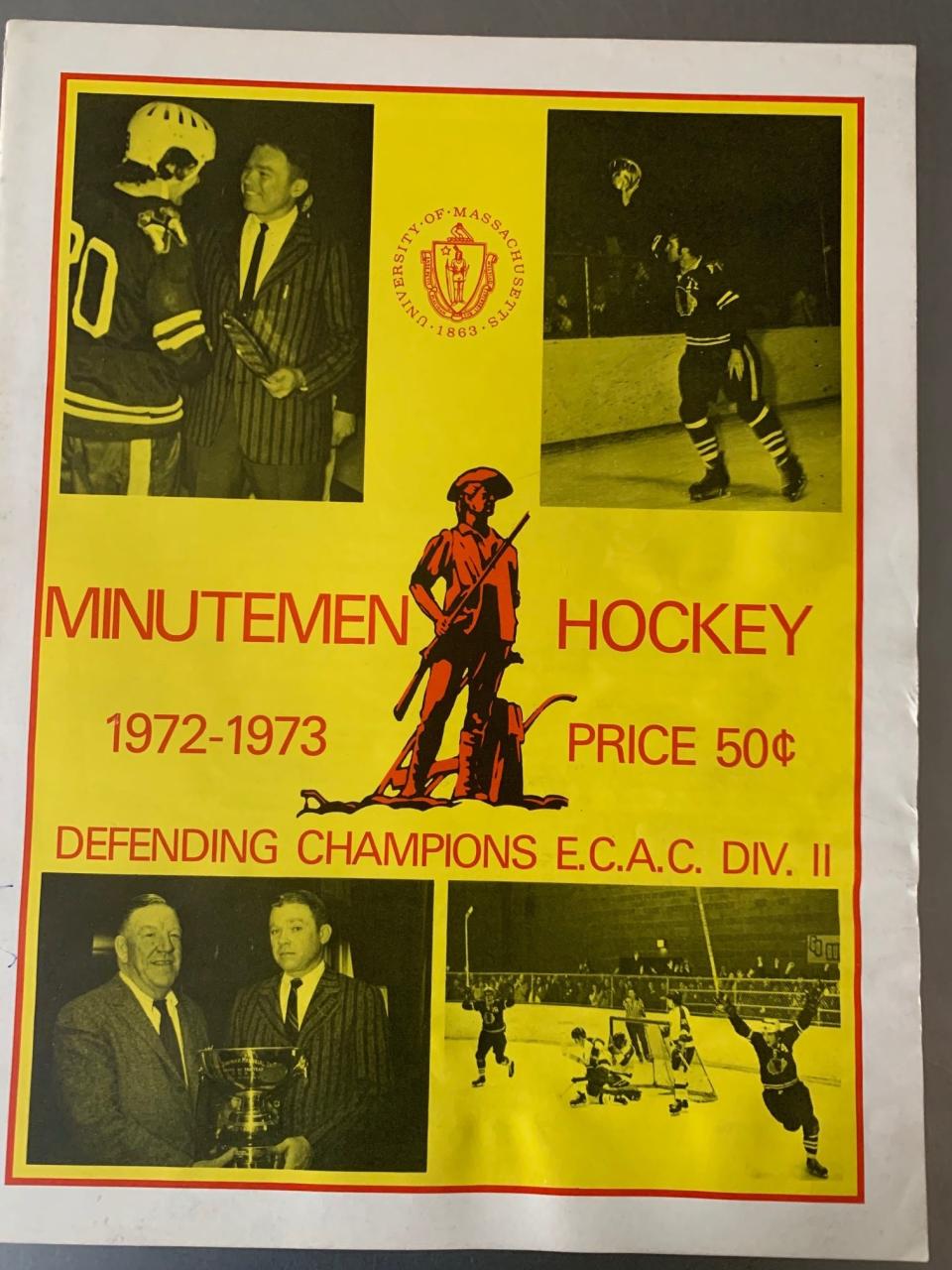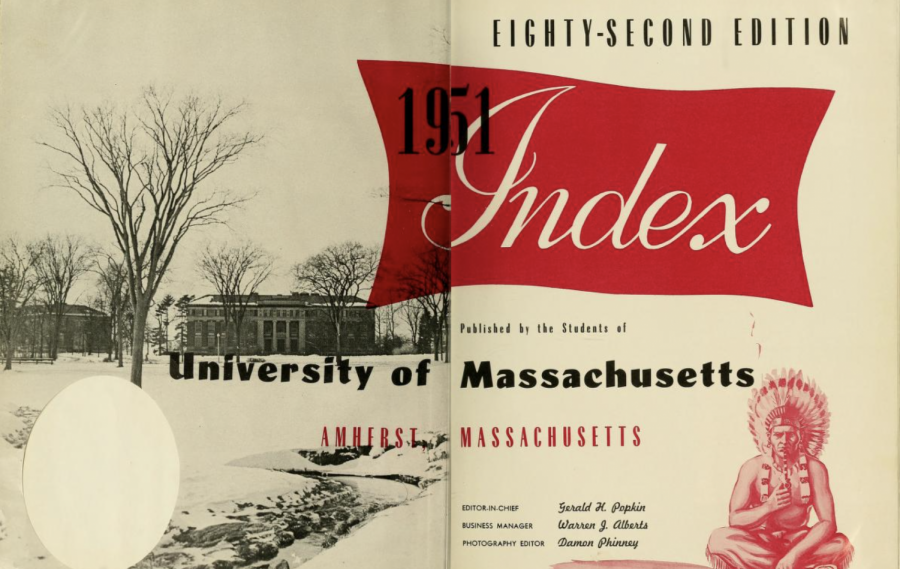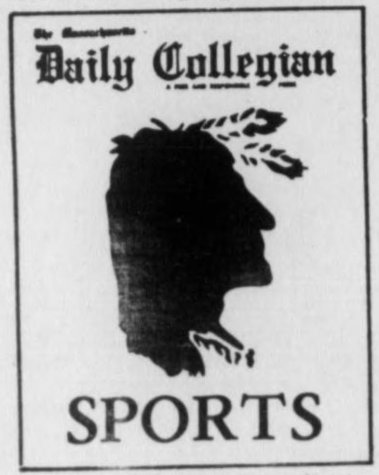Collegian sports editor delivered UMass nickname that's still a winner 50 years later

Anniversaries are a daily event, but some are more eventful than others, and there are magic numbers.
One of them is 50, and it was 50 years ago on Friday, Sept. 29, that the University of Massachusetts became one of the first schools in the nation to change a racially insensitive nickname, discarding Redmen and adopting Minutemen.
It all happened in what seemed like, well, a minute. It all seemed to happen just a minute ago as well. The memory is very fresh in this mind because I was part of it.
The world changed rapidly even before cellphones, laptops and electric cars. The early years of the '70s were the tail end of massive cultural changes that probably dated to the assassination of John F. Kennedy in 1963. By 1972, we were all a little tired. The campus of UMass (there is only one UMass, just like there was no Queen Elizabeth I) was only 18 months removed from being part of a nationwide student strike and just a couple of years removed from freshmen having to wear beanies until the football team won its first game.
In September 1972, the Munich Olympics were marred by a massacre, and the Canadian and Soviet hockey teams played their memorable Summit Series. Watergate was just becoming a part of the vocabulary. However, when UMass opened for the school year just after Labor Day in ’72, its vocabulary had shrunk. Our sports teams had no nickname.
They had been the Redmen since 1948 when the school went from Mass. State University to the University of Massachusetts. Before that, the teams were known as the Aggies — back in the Mass. Agriculural School days — and then the Statesmen.
But these were unofficial nicknames generally created by headline writers. Redmen was official, chosen by a student vote.
The campus was all in with the Redmen. A statue of Native American leader Metawampe stood between the campus pond and Student Union. The Student Union restaurant — “The Hatch” for short — was actually named the Hatchet and Pipe.
Good grief — the rest rooms were labeled “Squaws” and “Braves.”
Pioneer in racial equality
UMass was hardly alone in employing a racially charged nickname at the time, and the school had been a pioneer in racial equality in its Mass Aggie days. It was the first predominantly white school to employ an African-American football coach, Matthew Bullock, in 1904. More importantly, it was the first to name an African-American captain, Bill Craighead, in 1905, with the captain being the person who really ran things in the early 1900s.
By 1966, though, the use of “Redmen” was being questioned. By 1972, both Stanford and Dartmouth had abandoned their “Indians” nicknames. In the spring of that year, a Native American group from New York contacted the UMass administration and Student Government Association (SGA); in April, that body passed a resolution saying, “Redmen connoted a stereotype of violence and savagery and created a false picture of American history.”

On May 3, in its final meeting of the academic year, the SGA officially condemned “Redmen” and supported a renaming.
The administration agreed, but it was too late in the school year to make any permanent changes, but the use of “Redmen” was subsequently abandoned. UMass’ fall teams in 1972 still had Redmen uniforms but were unnamed. “Squaws” and “Braves” had been immediately sanded off the bathroom doors in the Student Union, but the nickname issue remained unresolved.
Getting a new one was at the top of the to-do list.
David Bischoff, the dean of the School of Physical Education, was the point man. He was quoted in the school newspaper, The Daily Collegian, saying that he was pleased with the possibility of a name-the-team contest and that "The result of the University's responsive attitude of trying to change the nickname would make the transition easier.”
On Sept. 15, the administration announced the formation of a screening committee, and students were asked to drop off written suggestions at the SGA office.
Less than two weeks into my tenure as sports editor of The Collegian, I was named to the committee. It included five students and four others connected with the university. We had two weeks to sift through the suggestions, of which there were many.
This election had some candidate irregularities, not that it was rigged. There were some memorably clever, and memorably obscene suggestions, but they were too far out there — even by the standards of 1972 — to be taken seriously.
The campus debate was lively and often intense. Steve Tripoli, in charge of the editorial page as executive editor and who later became editor-in-chief (and was the best man at my wedding three years later, in the spirit of full disclosure) cultivated a wide range of opinion from columnists and letter writers.
It made for lively reading five mornings a week. There was strong sentiment to retain Redmen, but that was not an option. Viable suggestions included Rebels, Pioneers, Cardinals, Aggies, Brewers, Raiders, Colonials, Minutemen, Bay Staters, Statesmen and Artichokes.
On occasion, the standard column or letter about reducing student fees or changing the ratio of meat loaf to steak at the dining commons made its way into the paper as well.
Process moves right along
The screening committee met a couple of times before deciding on three finalists to be voted on at the SGA elections at the end of the month. We gathered a couple of times before nailing them down, with each committee member being allowed to submit a nomination.
On the way to a meeting in the Boyden Building, headquarters for the athletic department, I stopped by the office of hockey coach Jack Canniff for a quick chat. He asked where I was headed, and I told him. He responded by asking, “Do me a favor. Nominate Minutemen.”
By then Minutemen, also a finalist back in 1948, had emerged as the leading candidate anyway. Being first on the committee’s alphabetical list, I had the first nomination and officially submitted Minutemen. When the nominations and discussions were over, the list had been distilled to three names — Minutemen, Statesmen and Bay Staters.

The SGA elections were Thursday, Sept. 28, with the new nickname on the ballot. Minutemen won easily, so easily that it wasn’t worth counting all the ballots. An SGA representative simply said, “It was landslide.” On Sept. 29, SGA president Larry Ladd sent campus Chancellor Randolph “Bill” Bromery a memo certifying the result.
Bromery is a major figure in UMass history and likely was a major player behind the quick response to the name change. A geologist by profession, Bromery had served with the Tuskegee Airmen during World War II and as an African-American undoubtedly had personal experience with how words and symbols helped create racial stereotypes.
Most importantly, Bromery was also a very nice man. Collegian staffers would meet with him once a week in his office to discuss things collegiate and otherwise, and he would be most understanding if a meeting had to be cut short so we could get to a TV for the 4 p.m. showing of the Three Stooges on Channel 38.
This was the '70s, remember.
The new nickname got off to a promising start. The first game played by a UMass Minutemen team was that Saturday, with the football team winning at Harvard Stadium, 28-19.
It was the first of 50 years of victories and defeats. Minutewomen was recognized as its own nickname, and on occasion, Minutemen has been challenged as having its own negative connotations. There has been no greater evolution than the bathroom signs.
Not only are Squaws and Braves gone from the bathrooms in the brand new Student Union — so are Men and Women. The rest rooms are ungendered these days, but Minutemen is celebrating its 50th birthday, now the most enduring of the University of Massachusetts nicknames.
—Contact Bill Ballou at sports@telegram.com. Follow him on Twitter @BillBallouTG.
This article originally appeared on Telegram & Gazette: Minutemen nickname remains a winner at UMass 50 years later

